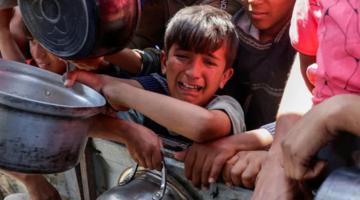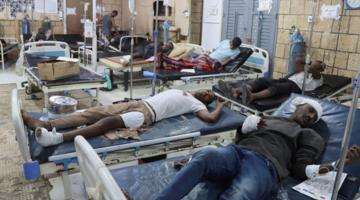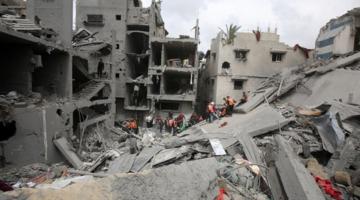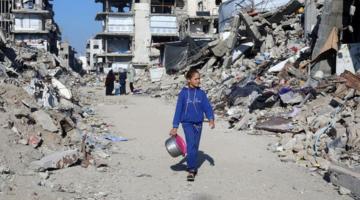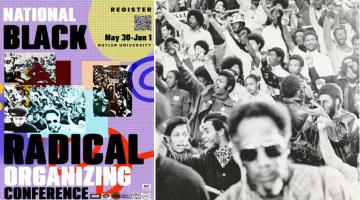Israel’s 'consumer tech terrorism' across Lebanon signals a terrifying new global threat, raising urgent concerns about the security of international supply chains and the growing insecurity of civilians worldwide.
Originally published in The Cradle.
Israel's coordinated attacks on Lebanon, marked by the near-simultaneous explosion of thousands of pager and walkie-talkie devices over two days, resulted in the deaths of at least 37 people, including children, and left thousands severely wounded.
This brutal terrorist attack should serve as a dire warning to the world: a stark reminder that the occupation state’s criminal actions know no limits, indiscriminately targeting those who challenge its interests, or those of its western allies.
In the wake of this aggression, who can guarantee that Israeli exports to other countries won’t be weaponized in future conflicts? The "pager attack" serves as yet more evidence that Israel poses a global threat, ushering in a dangerous, dystopian new era in which civilians are no longer safe, even in their own homes.
Terrorist act or war crime?
When analyzing the pager detonations from a legal standpoint, it becomes clear that Israel's killing spree in Lebanon this week lies somewhere between a war crime and an act of terrorism. The legal classification depends on the current state of affairs between Lebanon and Israel. If Lebanon is considered to be at war with Israel, the targeting of civilians — non-combatants — through the bombing of pagers blatantly violates international laws of warfare, including the Geneva Conventions.
Article 51 of Additional Protocol I to the Geneva Conventions (1949) strictly prohibits indiscriminate attacks on civilians, and Article 85 lists attacks on civilians as grave breaches that amount to war crimes. In this case, we must identify who qualifies as a "combatant" under international humanitarian law.
A combatant is defined as someone under military command, wearing a distinguishable uniform and openly carrying weapons. Without these markers, those targeted in the pager attack are considered civilians under international law.
Additionally, the attack violates the principles of distinction and proportionality, fundamental tenets of international humanitarian law. The principle of distinction mandates that combatants must be differentiated from civilians — a rule clearly ignored in Israel’s attacks, evidenced by the deaths of children.
The principle of proportionality prohibits attacks where the harm to civilians is excessive compared to the military advantage gained. In this instance, the minimal military impact pales in comparison to the devastating toll on civilians, including the psychological and moral damage inflicted. Therefore, Israel's adoption of a strategy of indiscriminate violence during its recent aggression against Lebanon is a war crime.
The Guardian notes that half a century after the Second World War, a global treaty — to which Israel is a signatory — came into force, which “prohibited in all circumstances to use booby-traps or other devices in the form of apparently harmless portable objects that are specifically designed and constructed to contain explosive material.”
'Terrorism' by all definitions
However, if we consider that Lebanon is not in a formal state of war with Israel, the aggression falls under a different legal classification: terrorism.
According to the International Convention for the Suppression of Terrorist Bombings (1997), Israel’s actions can be categorized as a "terrorist bombing." The use of civilian devices, like pagers, in non-military zones with the intent to spread fear aligns with the convention’s definition of terrorism, which criminalizes the unlawful use of explosives to target civilians or infrastructure with the intent to intimidate populations or coerce governments.
The UN General Assembly Declaration on Measures to Eliminate International Terrorism (1994) defines terrorism as any act aimed at causing death or serious bodily harm to civilians for the purpose of intimidating a population or compelling a government or international organization to act. Accordingly, the pager bombings were intended to intimidate the Lebanese and the resistance or force them to make concessions, which is consistent with the definition of terrorism under customary international law.
Yesterday, Belgian Deputy Prime Minister Petra De Sutter condemned the "massive terrorist attack" in Lebanon and Syria, while Volker Türk, the UN High Commissioner for Human Rights, wrote in a statement that the attack "violates international human rights law, and, to the extent applicable, international humanitarian law."
An Israeli own goal?
Israel’s pager bombing has also sparked global concerns about the security of international supply chains. If Israel has indeed begun weaponizing civilian devices through third parties in other countries, this raises the terrifying prospect that supply chains once thought to be safe could be compromised at any time.
In an interview with India Today TV, a technologist expressed concern that Israel’s actions could lead to similar risks in other countries, creating the possibility of booby-trapped electronics infiltrating homes worldwide.
The implications are profound: Israel’s actions signal a new level of risk to global trade, where civilian products may be tampered with for political or military advantage. What was once a matter of state-to-state conflict is now a threat to individual households.
The pager aggression is also likely to have an impact on exports of Israel's lauded technology developments. Obviously, confidence in these industries globally will decline significantly, with observers already commenting on the likelihood of Israeli infiltration — backdoors, control features, and spyware — into their export product lines.
While Tel Aviv pats itself on the back for what it considers to be a major Israeli tactical success in Lebanon this week, it perhaps does not yet realize that it has scored an even greater strategic failure.
In 2023, high-tech industries accounted for 20 percent of Israel's GDP. The volume of GDP in the high-tech sector in 2022 amounted to NIS 290 billion — or around $76 billion. In 2023, the high-tech industry accounted for 53 percent of total exports from Israel. But if the ‘pager attack’ succeeds in eroding global trust in Israel's tech offerings, this will constitute a major strategic blow to the occupation state's economy.
We are all at risk
Gold Apollo, the Taiwanese manufacturer of the brand involved in the explosive pagers, issued a statement distancing itself from the controversy. While the pagers bore their name, Gold Apollo claimed they had no involvement in the actual manufacturing.
The devices in question, AR-924 pagers, were allegedly produced by Budapest-based BAC Consulting KFT, a commercial intermediary licensed to use the Gold Apollo brand. Gold Apollo stressed that BAC was responsible for the design and manufacture.
Hungarian government spokesman Zoltán Kovacs also denied any knowledge of the pagers being manufactured in Hungary, stating that BAC Consulting KFT had no operating facilities there. In addition, Cristiana Bársony-Arcidiacono, CEO of BAC Consulting, denied any involvement in the actual production of pagers. In an interview with NBC News, she explained, "I don’t make the pagers. I am just the intermediate. I think you got it wrong."
Despite these conflicting statements, Taiwan’s Ministry of Economic Affairs confirmed that from early 2022 to August 2024, Gold Apollo exported over 260,000 pagers, primarily to European and American markets, raising further questions about the murky supply chain and the role of intermediaries like BAC Consulting.
Needless to say, if Israel is allowed to continue unchecked, the world could face a future where no communication device, no electronic gadget, and no technological infrastructure is truly safe from sabotage.
Counter-resistance strategy
Israel’s high-risk, escalating strategy against Lebanon appears to be aimed at forcing Hezbollah to stop supporting Gaza while imposing new rules that favor Israeli security interests. This tactic, which evolves based on Hezbollah’s retaliations, threatens to shift the balance of power in the region. Bombing-by-pager may be only the beginning of a broader plan to use technological and security infiltrations to disrupt the resistance and strike fear into its popular support base.
Hezbollah’s response has been unequivocal: Secretary General Hassan Nasrallah vowed in his televised speech on Thursday that the organization would deliver a "tough retribution and just punishment, where it [Israel] expects it and where it does not."
The Lebanese resistance chief also added: “We have received messages that the objective behind this strike is to halt the fighting on the Lebanese front, and threats that there will be more if we don’t stop,” but concluded with a warning to Tel Aviv that Hezbollah will not cease in its support for the resistance in Gaza under any circumstances.
This shift in the rules of engagement, where civilians are targeted not just on the battlefield but in their homes, threatens to plunge the world into a new era of insecurity and uncertainty. Governments and citizens alike must now contend with the possibility that the next device they purchase could be weaponized against them, as Israel’s aggression moves beyond traditional warfare into the realm of global terror.
The resistance's resolve to fight back has made it clear that the confrontation with Israel will escalate, and the world must decide how to address a growing threat that transcends borders and affects every citizen. The future depends on how swiftly and effectively the civilized world can act to prevent further atrocities, but to do so, they must first deter Israel - which birthed the weaponization of consumer tech - by punishing it.
Mohamed Sweidan is a strategic studies researcher, a writer for different media platforms, and the author of several studies in the field of international relations. Mohamed's main focus is on Russian affairs, Turkish politics, and the relationship between energy security and geopolitics.

